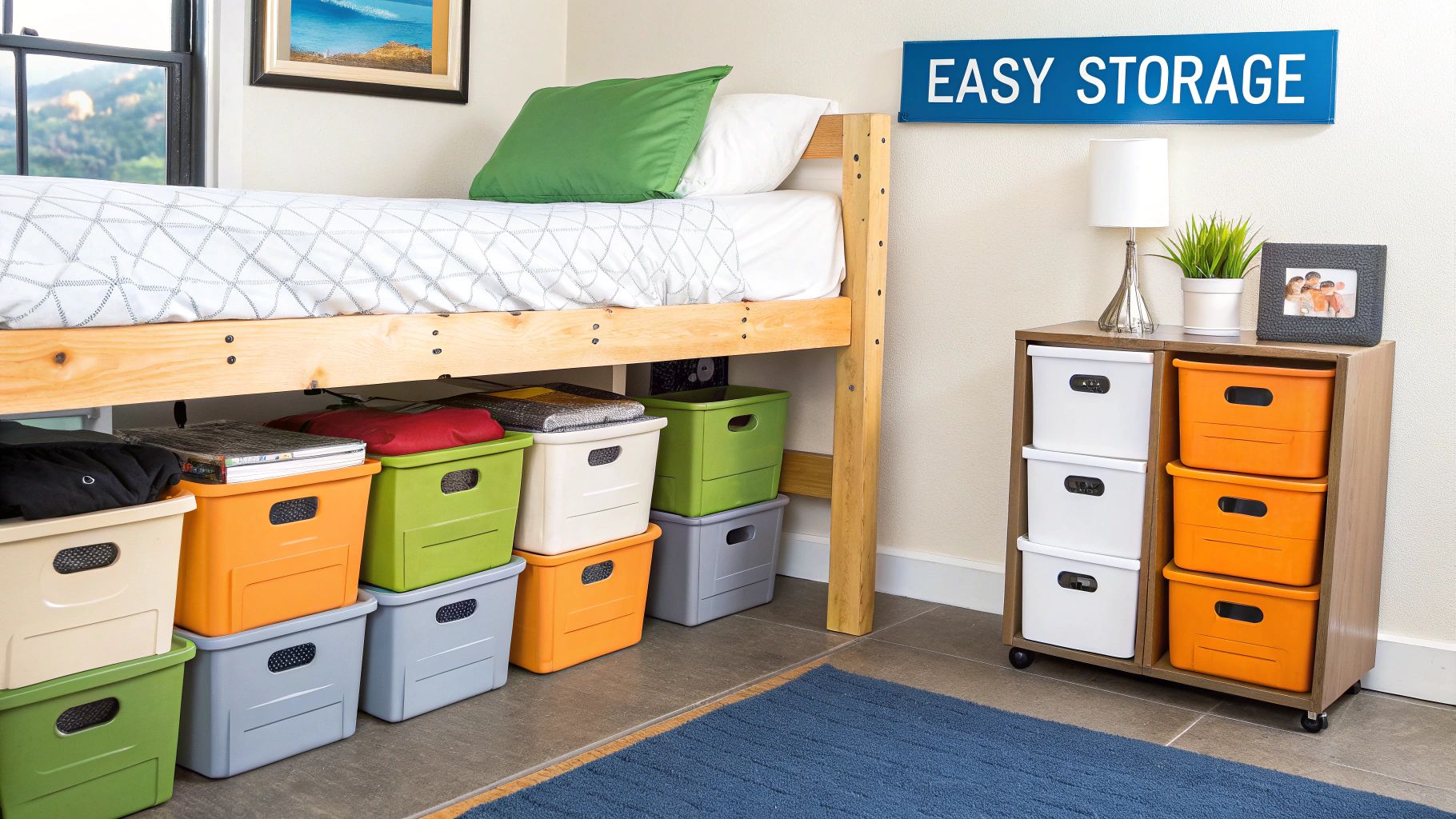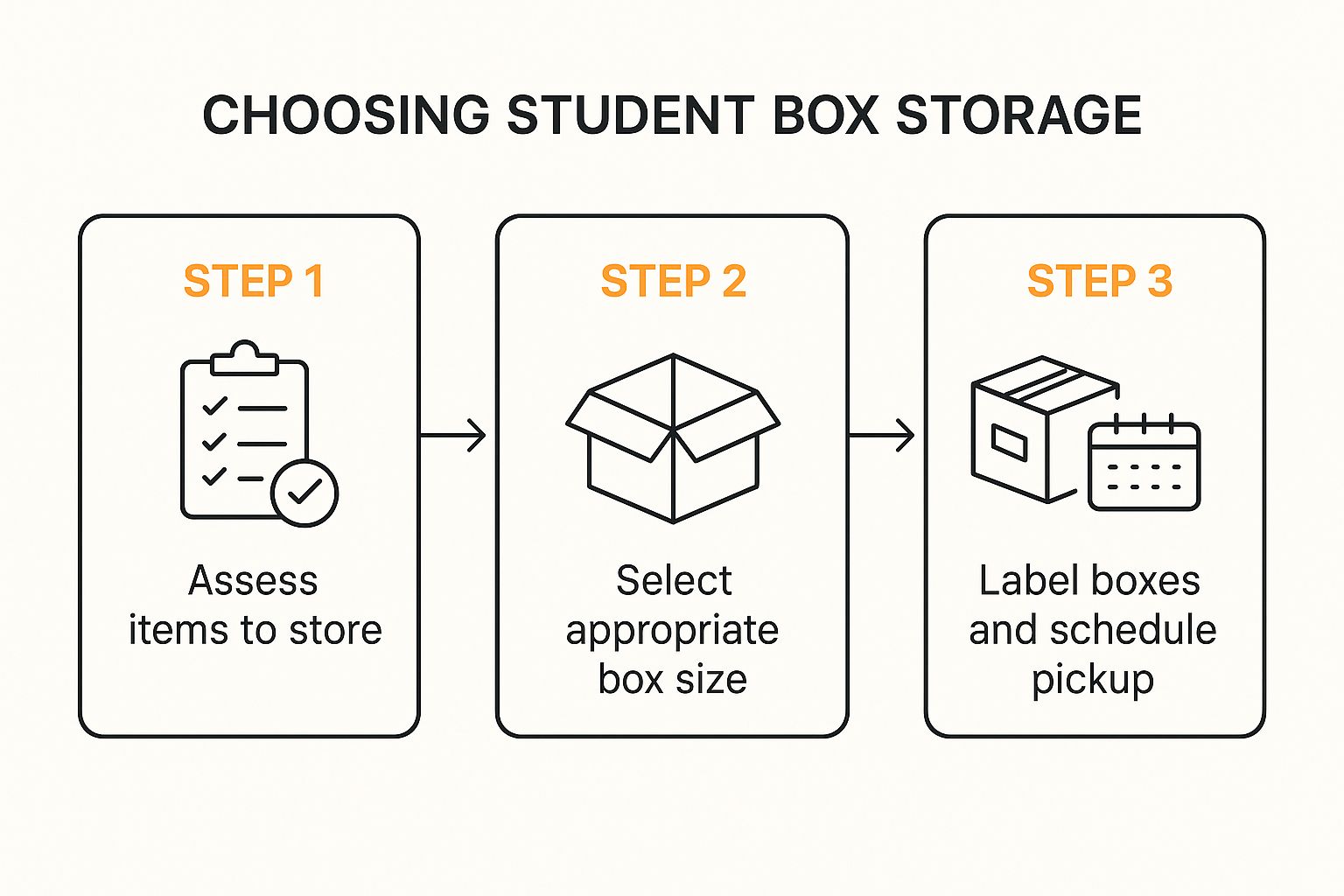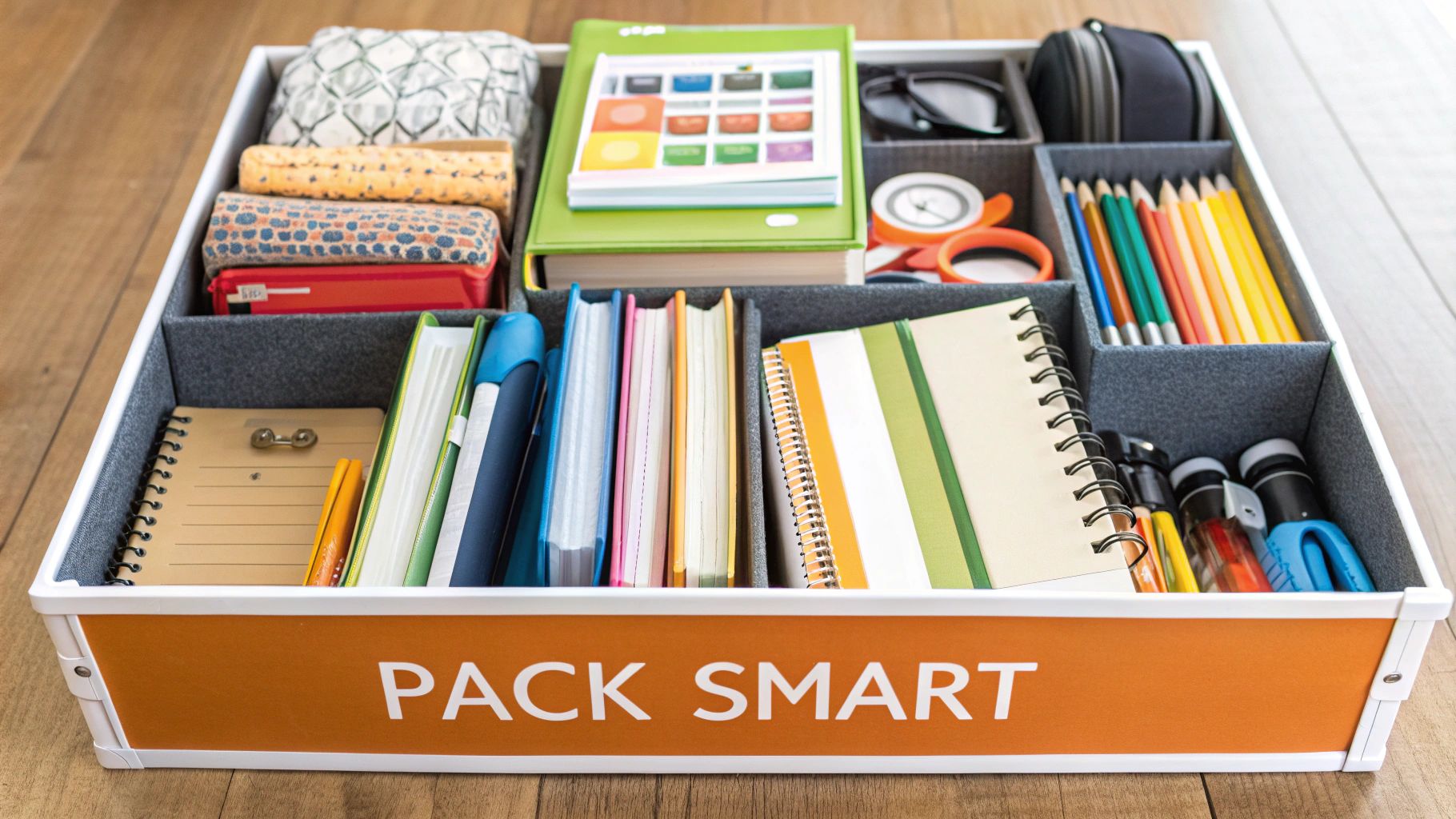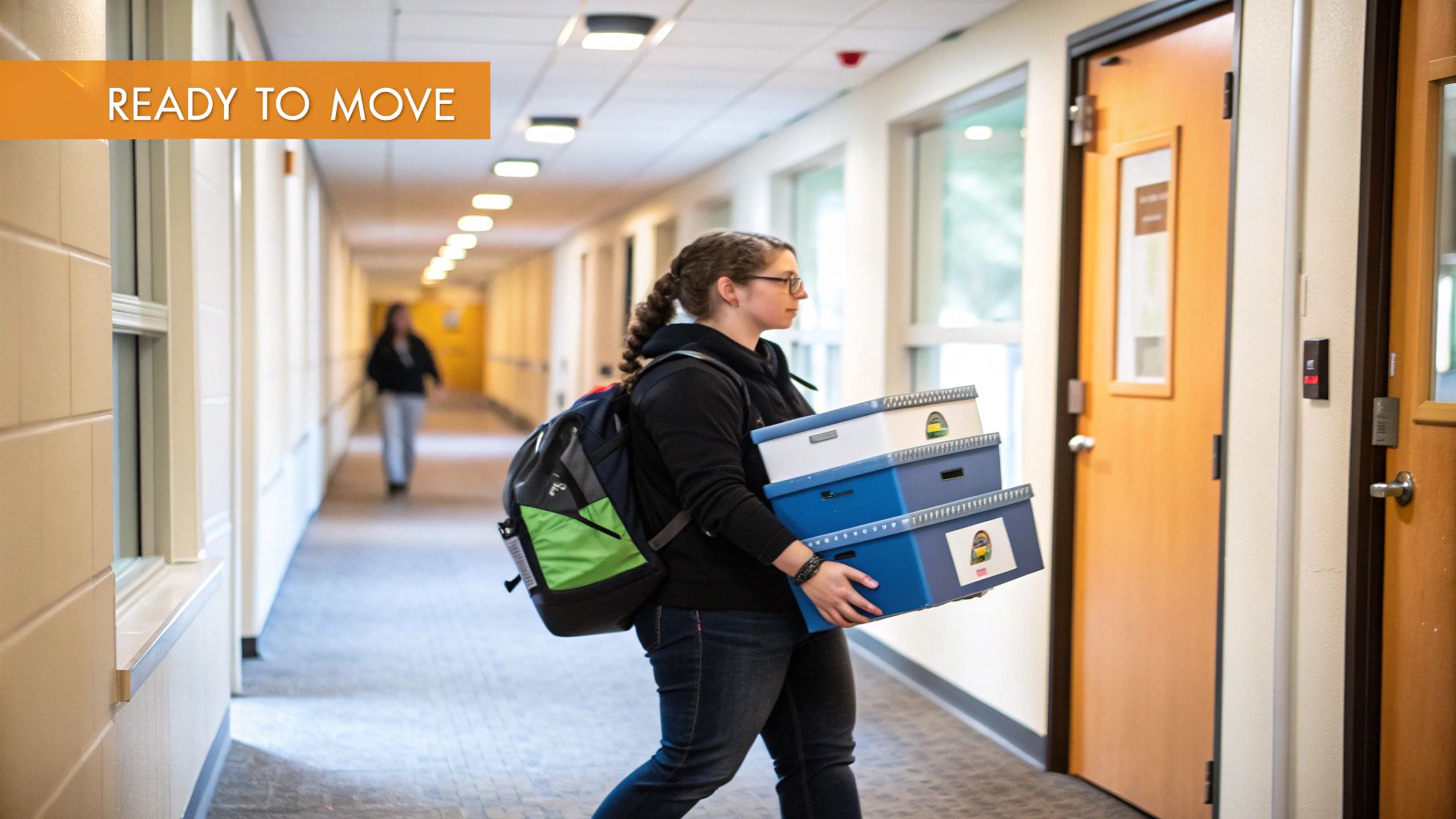The yearly shuffle between student halls and houses is a ritual most of us know all too well. It's organised chaos at best. Student box storage cuts right through that stress, giving you a straightforward, secure way to park your belongings over the summer or just reclaim some floor space in your room. It’s simply the smartest way to handle your stuff without the drama of hauling it all back home.
Why Student Box Storage Is a Game Changer
That endless cycle of packing, moving, and unpacking is a real headache. Whether you're off home for the summer, making the big move from halls to a shared house, or heading abroad for a semester, the question of what to do with your belongings is always a major stress. This is exactly where student box storage completely changes the game.
Forget about the hassle of hiring a van or calling in a favour from your parents. These services deliver exactly what you need right to your door: sturdy boxes, ready for you to pack. Once you're done, they collect them and keep everything safe and sound until you’re ready for it again.
The Reality of Student Living
Let's be honest, student rooms aren't exactly known for their generous square footage. You're usually working with a small space where every inch is prime real estate. Trying to find a home for last semester's textbooks, out-of-season clothes, or that hockey stick can make your room feel cluttered and chaotic in no time.
Student box storage gives you that much-needed breathing room. It’s a genuinely practical way to manage your possessions so they don’t end up taking over your life. This is a lifesaver for international students or anyone studying far from home, where taking everything back is just not feasible. The constant moving is a well-known part of UK uni life; with over 60% of students relocating at least once during their studies, this transient lifestyle creates a huge need for flexible storage.
Student box storage isn't just about finding more space; it's about buying back your time and sanity. It solves one of the biggest logistical nightmares of university life, freeing you up to focus on what really matters—like exams or actually enjoying your holiday.
More Than Just Summer Storage
While the summer break is peak season for stashing your stuff, the benefits don’t stop there. Think about all the other times a simple storage solution could come in handy throughout the academic year.
Here are a few common situations where it’s a lifesaver:
- Pre-Exam Declutter: Clear out your room to create a more focused and productive study zone when you need it most.
- Gap Year or Semester Abroad: Keep your belongings safe and secure while you’re off travelling, without having to pay rent on an empty room.
- Downsizing Your Digs: Moving into a smaller place next year? Store those non-essential items you can’t quite bring yourself to get rid of.
At the end of the day, it offers a flexible and surprisingly affordable answer to that nagging question: "Where on earth am I going to put all this stuff?" And while student-specific box services are great, it's also worth looking into the wider range of diverse storage solutions available to make sure you find the perfect fit.
Choosing the Right Boxes and Storage Plan
When it comes to student storage, a bit of guesswork can end up costing you. Picking the wrong box sizes or underestimating how much space you need is a classic mistake, leading to either paying for empty air or facing a last-minute panic when everything doesn't fit. The real goal is to get your storage plan just right, so you only pay for the space you actually use.
It all kicks off with a quick inventory of what you're actually storing. Don't just glance at the piles on your floor. Think practically. Heavy stuff like textbooks, a stack of vinyl, or kitchen gadgets needs to be in small, strong boxes. Trust me, a huge box filled with books is a disaster waiting to happen – it's a nightmare to lift and the bottom will almost certainly give out.
On the other hand, things that are light but take up a lot of room, like your duvet, pillows, or that massive winter coat, are perfect for the larger boxes. Using big boxes for bulky items is a smart way to pack efficiently without creating something you can't physically move.
This whole process can be broken down into a few straightforward stages, as you can see here.
Following a clear path from sorting your stuff to booking a collection means you won't miss anything important along the way.
Pay-Per-Box vs A Small Storage Unit
Next up is deciding on the type of storage that suits you best. For most students, it’s going to come down to one of two options, and the right choice really hinges on how much you’ve got to pack away.
Pay-per-box storage is incredibly popular, and for good reason. It’s perfect if you only have a few boxes to store, maybe with an awkward item like a guitar or a printer thrown in. You’re charged for each item individually, making it a brilliant, cost-effective solution for anyone travelling light.
But what if you've got more? If you’re storing furniture like a desk, a mattress, or a serious collection of books, the individual costs of a pay-per-box service can quickly mount up. This is the point where a small self-storage unit starts to make a lot more sense. A 10 or 15-square-foot unit can often work out cheaper when you're dealing with a larger volume of belongings.
My rule of thumb? The tipping point is usually around 10-12 standard boxes. If you've got more than that, or several pieces of furniture, it's definitely time to compare the price of a small unit against the per-item cost. You’ll likely find that a unit gives you much better value for your money.
Matching Your Items to the Right Box Size
Here’s a quick reference to help you visualise what goes where. Getting this right from the start saves a lot of hassle later.
| Item Category | Example Items | Recommended Box Size | Packing Tip |
|---|---|---|---|
| Heavy & Dense | Textbooks, tins, vinyl records, small appliances | Small (approx. 12x12x12 inches) | Keep weight under 15kg per box to make it easy to lift and stack safely. |
| Everyday Items | Clothes, shoes, kitchenware, computer monitors | Medium (approx. 18x18x16 inches) | The workhorse box. Use bubble wrap for fragile items like plates or screens. |
| Light & Bulky | Duvets, pillows, towels, winter jackets | Large (approx. 18x18x24 inches) | Perfect for items that take up space but don't weigh much. Don't overfill. |
| Odd-Shaped | Desk lamps, sports equipment, musical instruments | Speciality Boxes or By-the-Item | Ask your storage provider. Many offer custom solutions for non-standard items. |
Packing smart isn't just about fitting things in; it's about making sure they come out in the same condition they went in.
Estimating Your Space Requirements
Before you book anything, lay out all the items you plan to store. Try to visualise how they’ll pack down. It helps to group things by category – clothes, books, kitchen stuff – and then mentally assign them to different box sizes.
If you’re still struggling to picture it, most storage companies have online calculators to give you a hand. For a really thorough look at what might work for you, this guide on how much storage space you might need is a great resource. A few minutes of planning now will save you a world of stress and money later on.
How to Pack Your Boxes Like a Pro
There’s a real art to packing for storage. Get it right, and everything you put away comes back out in perfect condition. It’s not just about playing Tetris with your belongings; it’s a strategy to protect your things, make the most of your space, and save yourself a headache when it’s time to unpack.
The golden rule of packing starts with weight. One of the biggest mistakes I see is someone cramming all their heavy textbooks into one massive box. It becomes an unmovable, back-breaking brick that’s just begging for the bottom to fall out.
Remember this simple mantra: heavy items go in small boxes, and light, bulky items go in large boxes. Your future self will be grateful.
Strategic Packing for Student Essentials
A student's room is a unique collection of stuff, isn't it? You've got fragile tech, odd-shaped pots and pans, and piles of books. Each type of item needs a slightly different packing method to make sure it travels safely to your student box storage and back again.
Let's start with your most prized possessions. Your laptop, monitor, or games console should be wrapped individually in something soft. You don’t need to buy rolls of bubble wrap – towels, jumpers, and even your duvet make for fantastic (and free) padding. It’s a classic two-for-one trick that protects your electronics while packing your linens simultaneously.
When it comes to the kitchen, don't stack plates flat. Instead, place them vertically in the box, like records in a crate. They are much stronger this way and far less likely to crack. Wrap each one in newspaper or a tea towel for extra protection. For mugs and glasses, stuff them with clean socks to stop them from chipping or shattering.
Here's a tip that will save you so much time later: create a simple inventory. Grab a marker, number each box, and keep a list on your phone of what's inside (e.g., Box 1: Textbooks, stationery. Box 2: Winter jumpers, scarves). No more frantic searching for that one specific hoodie.
Maximising Space and Labelling Clearly
For clothes, rolling is always better than folding. It's not just a travel hack; rolled clothes take up way less room and tend to come out with fewer creases. If you’ve got bulky items like a winter coat or a duvet, vacuum-pack bags are an absolute game-changer, shrinking them down to a surprisingly small size.
This need for clever packing is a growing trend. In fact, research shows that a massive 81% of young UK consumers feel they need more space at home. Storing seasonal items or things you just can't part with is a real challenge in smaller living spaces, so making every inch of your boxes count is key.
Once a box is packed, don't be shy with the packing tape. Seal it firmly across the top and bottom seams to give it extra strength. If you’re hunting for more clever ideas, these super easy packing tips offer some great advice. For a deeper dive into making sure everything is packed efficiently and safely, you can also explore some professional packing strategies for moving. At the end of the day, proper packing is the best insurance policy you can have against damage.
Booking Your Collection and Getting Your Boxes into Storage
Right, your boxes are all packed and ready to go. The next bit is actually getting them from your student digs into a secure storage unit. Thankfully, this part is usually dead simple. Most companies have a slick online booking process that’s as easy as ordering a takeaway – you just select how many boxes you have, pick a collection date, and pop in your details.
Don't just click through this stage on autopilot, though. You'll probably see an option for extra insurance, which is a really smart idea if you're storing anything valuable like a laptop, camera, or expensive textbooks. You'll also need to choose a collection slot. Be honest with yourself here – the final week of term is a whirlwind of deadlines and goodbyes. Don't book a collection that clashes with your last exam or the mad dash to hand back your keys.
My best advice? Book this well in advance, especially if you're moving out at the end of the spring or summer term. Everyone is doing the same thing, and if you leave it to the last minute, you might find there are no slots left or the prices have shot up. A little bit of planning now saves a mountain of stress later.
Doorstep Collection vs. Dropping Them Off Yourself
One of the biggest choices you'll make when booking is how your stuff actually gets to the storage facility. Most services that cater to students will give you two main options.
- Doorstep Collection: This is the gold standard for convenience. A driver comes right to your halls or student house to pick everything up. No begging friends for a lift, no wrestling heavy boxes onto a bus. It’s a total game-changer.
- Facility Drop-Off: If you've got your own car or live just around the corner from the storage centre, you could choose to drop your boxes off yourself. It can sometimes work out a bit cheaper, but you have to balance the cost saving against the hassle factor.
Honestly, for most students, doorstep collection is a no-brainer. The small extra fee is almost always worth it to avoid the logistical nightmare of moving a room's worth of stuff across town on your own.
The key is to choose what genuinely works for you. If your parents are helping you move out and have a car, a drop-off might be simple. But if you're managing the move on your own, paying for collection will feel like the best money you’ve ever spent.
Nailing Down Your Collection Day
Once you’ve decided how your boxes will get there, it’s time to lock in a date and time. Most companies will give you a collection window of a few hours, say between 9 am and 1 pm. You absolutely need to be available for that whole time slot. Don't plan anything else.
Make sure every single box is taped up, sealed shut, and clearly labelled before the driver is due to arrive. It’s also a good idea to have them all stacked neatly by the door. A bit of prep makes the actual handover take minutes. The whole process is incredibly straightforward, and you can learn more about the nuts and bolts of how to rent a storage unit to get a feel for the specifics.
This is the final step that turns your mountain of packed boxes into a problem solved, freeing you up to focus on what really matters – acing your exams and heading home for a well-deserved break.
Making Sure Your Belongings Are Stored Securely
Let's be honest, handing over your laptop, textbooks, and personal stuff for someone else to look after takes a bit of trust. You need absolute confidence that everything is being kept in a genuinely secure facility, not just gathering dust in some forgotten corner of a warehouse. When you're picking a student box storage provider, their security setup should be one of your top priorities. It's all about getting that peace of mind.
The best companies get this. They don't cut corners on security because they know they're looking after more than just 'stuff' – they're looking after your life. This means having multiple layers of protection, going way beyond a simple padlock on a door.
Key Security Features to Look For
Think of it like choosing a new flat – you wouldn’t rent a place with a flimsy lock, would you? Apply that same logic here. Don't hesitate to ask a company directly about the specific measures they have in place.
Here’s what I’d consider the absolute minimum:
- 24/7 CCTV Monitoring: This is your first line of defence. The facility should have cameras covering all the key areas – entrances, exits, and the main corridors at the very least.
- Controlled Access: Who can get onto the site? It should be protected by secure perimeter fencing and a system like a keycard or a unique PIN code. This stops just anyone from wandering in.
- Individual Unit Security: It’s not enough for the building to be secure; your boxes should be stored within a unit that is itself individually secured.
A good rule of thumb: if a storage company is vague about its security, that's a massive red flag. The best providers are proud of their systems and will be upfront about how they protect your belongings.
Protecting Your Valuables with Climate Control
Some of your most expensive items are also the most delicate. Think about your laptop, tablet, or camera – they really don't do well with extreme temperatures or damp conditions. The same goes for things like musical instruments, important documents, or even old photographs that you can't replace.
For anything sensitive, a climate-controlled unit is a must. These units keep the temperature and humidity at a constant, safe level, which stops problems like mould, mildew, and warping before they can start. Yes, it might cost a little more, but it’s a tiny price to pay to avoid irreversible damage to your most prized possessions.
The need for this kind of reliable student storage is a big reason the UK's self-storage market is booming. In the last year, the total available space shot up by 7.2% to a massive 64.3 million square feet. It just goes to show how essential secure, easy-access storage is for students today. You can dive deeper into the industry trends and read the full self storage report.
Why Insurance Is Non-Negotiable
Finally, whatever you do, don't skip the insurance. Even with Fort Knox-level security, you can never rule out the unexpected. Any professional storage company will either include insurance in their service or insist that you have your own cover. This protects you from the financial sting of things like fire, flooding, or theft.
Before you commit, read the policy details. Know exactly what's covered and what the value limit is. It's also a good idea to check your parents' home insurance, as some policies extend to cover your belongings while you're away at uni. Just make sure the cover is enough for everything you're storing. Going without it is a gamble you don't want to take.
Your Top Student Storage Questions Answered
Even when you've got a plan, a few questions are bound to pop up. The world of student box storage is meant to be simple, but it’s normal to wonder about the specifics. Let's run through the common queries we hear all the time to make sure you're completely clear and confident before booking.
Think of this as the practical, no-nonsense part of the guide. We've pulled together the real-world questions students ask most, from needing to grab a textbook halfway through the holidays to what happens when your plans suddenly go sideways. Getting these sorted now will save you any headaches later.
Can I Get to My Boxes While They’re in Storage?
This is a big one, and the honest answer is: it depends. The type of service you pick makes all the difference here.
If you’ve gone for a 'pay-per-box' service, where they collect your boxes and store them in a massive central warehouse, then the answer is almost always no. Those services are built on a model of collecting and stacking everything together for maximum efficiency, which makes pulling out one person's boxes mid-term a logistical nightmare.
On the other hand, if you rent a small self-storage unit yourself, then absolutely. You'll have your own key or access code. You can pop down to the facility during its opening hours and retrieve that winter coat or crucial textbook whenever you need it.
Before you book, have a real think about whether you'll need to access your stuff. If there's even a small chance, a personal self-storage unit gives you a level of flexibility that a simple box collection service just can't match.
What If My Plans Change and I Need Storage for Longer?
Uni life is unpredictable. Maybe you've landed an unexpected placement, decided on a gap year, or your housing situation for next term has hit a snag. Don't worry. Most student storage companies get it and are usually very flexible about extending your booking.
In most cases, you can simply let your storage plan roll over on a month-by-month basis. If you find yourself in this situation, here’s the game plan:
- Get in Touch: The moment you know your plans have changed, give your storage provider a call or drop them an email. The sooner they know, the better.
- Confirm the Cost: Ask if the monthly rate will stay the same or if there are any changes for a rolling contract. It’s always best to check.
- Update Your Info: If you're going to be at a new address when you finally need your things back, make sure they have the correct delivery details on file.
Companies that deal with students expect plans to be fluid, so extending your storage is rarely an issue.
Is There Anything I’m Not Allowed to Store?
Yes, definitely. For everyone's safety and security, there are some common-sense rules about what can and can't go into a storage box. You can’t just throw anything in there. Every reputable company will have a clear list of prohibited items to protect your stuff, their staff, and their facility.
As a general rule, you won't be able to store:
- Flammable or hazardous stuff: Think aerosols, paint, petrol, fireworks, or harsh cleaning chemicals.
- Perishables: Any food or drink that can go off, rot, or attract pests is a strict no-go. This includes tins and sealed packets.
- Anything living: This one’s a bit obvious, but it means no pets and no plants either.
- Illegal or stolen items: Storage units can’t be used for anything dodgy.
Always have a quick scan of your chosen provider’s specific "prohibited items" list before you pack. It’ll save you a lot of hassle on collection day.
For a flexible, secure solution to your storage needs, Standby Self Storage offers a wide range of unit sizes perfect for students, with 24/7 CCTV and no long-term commitments. Find your ideal space and book online today at https://www.standbyselfstorage.co.uk.





